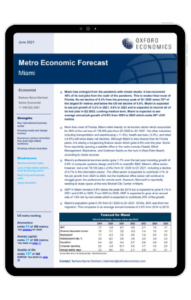US | Metro Economic Forecast: Miami

Miami has emerged from the pandemic with mixed results. It has recovered 48% of its lost jobs from the nadir of the pandemic. This is weaker than most of Florida. Its net decline of 6.4% from the previous peak of Q1 2020 ranks 33rd of the largest 51 metros and below the US net decline of 5.6%. Miami is expected to see job growth of 3.2% in 2021, 4.6% in 2022 and is expected to recover all of its lost jobs in Q2 2022. Looking medium term, Miami is expected to see average annual job growth of 0.8% from 2023 to 2025 which ranks 20th of 51 metros.
What you will learn:
- More than most of Florida, Miami relies heavily on its tourism sector which accounted for 35% of the net loss of 176,300 jobs from Q1 2020 to Q1 2021. Although Miami is less diverse than its Florida peers, it is seeing a burgeoning finance sector which grew 0.9% over the year.
- Miami’s professional services sector grew 1.1% over the last year including growth of 5.6% in computer systems design and 5.2% in scientific R&D. Miami’s office sector, however, lost a net 18,100 jobs (-2.6%) from Q1 2020 to Q1 2021, including a decline of 9.7% in the information sector.
- GDP in Miami remains 0.8% below the peak Q4 2019 but is expected to grow 8.1% in 2021 and 4.9% in 2022. From 2023 to 2025, GDP is expected to grow at an annual rate of 1.8% led by real estate which is expected to contribute 20% of the growth.
Tags:
Related Services

Post
GCC: Key themes shaping city economies in the near term
For Gulf cities, the near-term outlook will be tied not only to the global macroeconomic backdrop, but also the progress of the diverse visions and strategies in the region. With the aim to diversify their economies and reduce the dependence on oil, Gulf states continue to invest in the non-oil economy and implement various reforms. That said, oil revenues remain key to funding diversification efforts.
Find Out More
Post
Indonesia rate cuts will bolster credit demand, with pockets of risks
We forecast Bank Indonesia will start cutting its policy rate in Q2, which will provide a cyclical tailwind for credit growth and consequently domestic demand, as lower real lending rates will help boost loan demand.
Find Out More